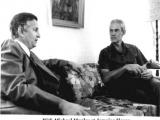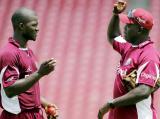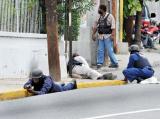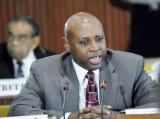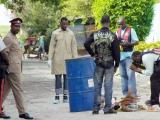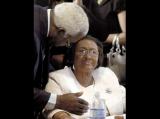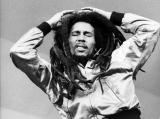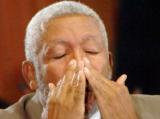Columns By Category
Popular Articles
- THE REALITY OF TACKY AND SAM SHARPE
- PLEASE DON’T BETRAY US AGAIN POLITICIANS
- CRY, MY MURDEROUS COUNTRY
- MODERNIZING THE PNP: VERSION.2020
- IS THE EXCHANGE RATE ON TARGET OR IS IT A WHOPPER?
- CARICOM: BEACON OF DEMOCRACY OR COWARDLY DISGRACE?
- DEMOCRACY PREVAILS IN THE UNITED STATES
- THE CRIME STATISTICS SPEAK FOR THEMSELVES
- PETROJAM, OIL PRICES, AND THE $7 TAX
- Kevin O'Brien Chang | Brains, not brutality – smart(phone) crime fighting
- TERRORISM IN JAMAICA
- STOP CURRENCY CRISIS TALK
- 'CASTIGATED KD' AND THE 9 YEAR WONDER
- GET PAST MERE TALK ON DONS AND GARRISONS
- LOW VOTER TURNOUT MYTHS AND ELECTION PREDICTIONS
- HOW GREAT CAN BROGAD BE?
- PNP WAS SOCIALIST FROM THE START
- AN AGE AND GENDER RE-ALIGNMENT ELECTION?
- Most influential Jamaican of 2010-2019?
- NO GAYLE, NO RUSSELL, NO TALLAWAHS
2011 Articles
Political Perception and Numerical Reality
- Article
- July 31, 2011
- No comments
Of the 10 contested general elections since Independence, the PNP has won six, outpolling the JLP by an average of 6.3 points. Which gives statistical support to the adage that 'Jamaica is PNP country'.
Dig a bit deeper and the equation shifts. Under Edward Seaga, the JLP lost five of six contested elections by an average margin of 8.9 points. The other four elections saw three JLP wins, with an overall PNP margin of 2.4 points - 'within the three per cent margin of error', as pollsters would say.
The Cost of $exual Abuse and Rape
- Article
- July 3, 2011
- No comments
I recently had a talk with Marie Sparkes, director of Pure Potential LLC Jamaica, whose company has been strategically getting our Jamaican society at all levels to deal more seriously with the terrible problem of childhood sexual abuse and rape.
West Indies Cricket Must Reform or Die
- Article
- June 19, 2011
- No comments
Things are never so bad that they can't get worse. It's a lesson West Indies cricket fans have learnt ad nauseam over the past 15 years. Since 1995 we have watched in disbelief as unimagined new depths are regularly plunged. First Test series defeat in more than 10 years. Series whitewash. All out for 47. Beaten by Bangaladesh. Not even fielding our best 11. What will the next low be? The loss of Test status?
Tough on Crime, Tough on the Causes of Crime
- Article
- June 12, 2011
- No comments
From May 23-25, 2010, the Jamaican populace cowered as armed gangsters torched police stations and attacked large swathes of the capital, while the security forces struggled to regain control. There was a real fear of violence exploding across the island and the very foundations of the state seemed at risk. Who could have imagined then that murders would fall by roughly 40 per cent over the next year?
Manatt Facts and Fiction
- Article
- April 10, 2011
- No comments
The famous Japanese story, 'In a Grove', presents seven varying accounts of a samurai's death. Each chapter both clarifies and obfuscates what the reader knows, creating a confused vision of events that brings into question the human capacity to perceive and transmit objective truth.
This probably sounds familiar to anyone who followed the Dudus-Manatt enquiry. Not only did witnesses often contradict each other, but media coverage was extremely inconsistent, often highlighting trivialities and ignoring crucial pieces of evidence. No wonder the majority of Jamaicans, who followed events mainly through radio and TV clips and newspaper reports, could not make heads or tails of what took place, and mostly dismissed it as 'a waste of time'.
Murder Tipping Point?
- Article
- April 3, 2011
- No comments
Lots of countries suppress bad news and exaggerate good news so as to put on a 'happy face' to the world. Jamaica must be the only place on the planet where the media trumpet national misfortunes and hide positive deve-lopments. Our press constantly refers to 73 persons dying in last May's Tivoli Gardens incursion, but remains silent about the subsequent 37 per cent decline in murders, which has, in effect, 'saved' more than 540 lives.
How can anyone who truly loves this country not exult when they see numbers as these?
CSI Manatt in Wonderland
- Article
- March 20, 2011
- No comments
A phantom email. A mystery letter. Obeah envelopes. St Patrick's Day at the Manatt enquiry was straight out of Alice in Wonderland.
Perhaps the strangest turn was the reaction to the reply from Manatt to a letter sent by Attorney General Dorothy Lightbourne. Now, considering this entire thing is basically an enquiry into Manatt's role in the Christopher 'Dudus' Coke extradition, you would think all parties would be interested in anything the firm had to say. But the objection to the reading of this reply by Oliver Smith, Solicitor General Douglas Leys' lawyer, was supported by K.D. Knight.
Bob Marley Reggae Superhero; Lady Saw Dancehall Queen
- Article
- March 6, 2011
- No comments
Bob Nesta Marley is by far the most famous figure Jamaican music has ever produced. Mention Jamaica, and foreigners who scarcely know in which hemisphere the country is located will cry in recognition, 'Bob Marley!' Millions of people the world over know of reggae only because of him, and have never heard of another Jamaican musician. It's a truly unique fame, covering all corners of the Earth, surpassing in universality the adulation accorded to other rock martyrs like Elvis Presley and John Lennon.
Mout' Mek Fi Talk!
- Article
- February 27, 2011
- No comments
Question: Will Jamaica ever experience a people-power revolution à la Tunisia and Egypt?
Answer: Yes, when hell freezes over.
Since the first in 1944, Jamaica has held 13 universal adult suffrage general elections. Six of these were won by the party in power, six by the opposition, and in 1949, the incumbent party won the most seats but lost the popular vote. There have been no assassinations, coups, or revolutions. Not once has the legitimacy of an elected government ever been challenged. Post-World War II, no country on the planet can boast a better democratic scorecard.
Good Ad for Democracy
- Article
- February 13, 2011
- No comments
Enquiry, shamquiry. That was pretty much the initial attitude of the general public towards the ongoing Manatt-Dudus commission. Not only have we grown accustomed to enquiries costing taxpayers lots of money and producing nothing of value, but the relentless press coverage of the Manatt saga over the past year left most people utterly sick of the topic.
The early stumblings suggested a grand 'business-as-usual' waste of time. But the fitful stops and starts began to curiously coalesce into rather interesting courtroom theatre, and what started out as a tedious joke is becoming a pretty good advertisement for Jamaican democracy. Chairman Emile George left the gates a bit hesitantly, but has settled into a firm non-partisan stride, quickly quashing the constant efforts to politicise the proceedings.

